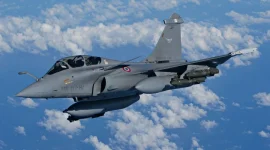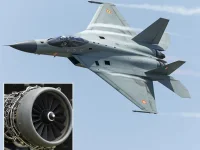In a significant push towards achieving self-reliance in military aviation technology, the Gas Turbine Research Establishment (GTRE) has proposed a plan to the Ministry of Defence to convert two Indian Air Force (IAF) Sukhoi Su-30 MKI fighter jets into flying testbeds.
This strategic initiative aims to dramatically speed up the testing and certification of Made-in-India aero-engines and their components.
This move is seen as critical for the future of India's indigenous fighter aircraft programs.
The successful development of these engine systems is vital for the upcoming Tejas Mk-2 and the futuristic Advanced Medium Combat Aircraft (AMCA), India's fifth-generation stealth fighter.
By accelerating the validation process, GTRE intends to align its efforts with the government's Atmanirbhar Bharat policy, which seeks to reduce dependency on foreign military hardware.
The proposal calls for outfitting two Su-30 MKI aircraft with specialized sensors and data-recording equipment.
The Su-30 MKI, a powerful twin-engine air superiority fighter, serves as the backbone of the IAF and is considered an ideal platform for this role due to its proven performance, robust airframe, and the IAF's extensive operational experience with the jet.
This familiarity helps in managing the complexities of integrating and testing new hardware.
Using the modified aircraft, GTRE engineers plan to collect real-time performance data on indigenous engine parts during actual flight conditions.
This data will be meticulously compared against the performance of the original components supplied by foreign manufacturers.
Such a direct comparative analysis is essential to confirm the reliability, thrust efficiency, and durability of the Indian-made systems, ensuring they meet the demanding standards required for combat aircraft.
This process effectively bridges the gap between laboratory tests and the harsh realities of operational flying.
GTRE has outlined a detailed and safety-conscious methodology for this project. Key aspects of the plan include:
- Performance Mapping: Engineers will monitor crucial parameters like thrust output, fuel consumption, and heat tolerance to ensure indigenous components perform on par with or better than their foreign counterparts.
- Proactive Safety Analysis: A technique known as Failure Modes, Effects, and Criticality Analysis (FMECA) will be employed to identify and address any potential design or material weaknesses early in the testing phase, thereby enhancing safety and system reliability.
- Phased Testing for Faster Clearance: Instead of waiting for the entire engine system to be ready, the proposal suggests a "staircase approach." This involves testing individual components and granting them clearance for a limited operational life based on initial flight data. This life can be extended as more successful test hours are accumulated, speeding up the overall certification timeline.
This reduces the reliance on time-consuming ground-based trials and computer simulations, providing a more accurate assessment of how the new engine systems will perform in service.
While the initiative promises to fast-track India's jet engine ambitions, it is not without challenges.
The modification of the Su-30 MKI jets and the integration of new, uncertified components will require seamless coordination between GTRE, the aircraft manufacturer Hindustan Aeronautics Limited (HAL), and the Indian Air Force.
Ensuring the absolute safety of the test pilots and the valuable aircraft during these crucial flight trials will remain the highest priority.




